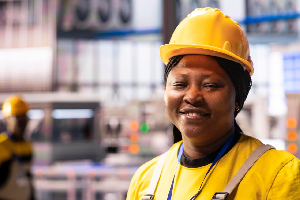The growth of Ghana’s manufacturing sector has declined over the last three years, the Association of Ghana Industries (AGI), has said.
Quoting statistics, the President of AGI, Mr. James Asare Agyei, said, while industry growth was pegged at two percent in 2012, the manufacturing sector recorded a negative growth of - 0.4 and - 0.5 percent in 2013 and 2014, respectively.
He described the trend ‘as a great concern’, which needed to be addressed urgently.
Mr Agyei was speaking at a ceremony held in Elmina in the Central Region to commission the Groupe Ndoum Industrial Estate, the latest addition to the Groupe Nduom (GN) conglomerate of about 50 subsidiaries.
Located at Elmina, the estate consists of four industries - Fresh Pak Products Limited, GN Electronics, GN Printing and GN Logistics - which specialises in food packaging products, electronic products, printing and logistics, respectively.
Mr. Agyei stated that indigenous industries were capable of taking advantage of market opportunities, if the right environment were created and the necessary incentives provided, while challenges such as power supply, high inflation and interest rates productivity were resolved.
Although he acknowledged efforts being made by the Government to resolve these challenges, he emphasised that the situation needed urgent and permanent solutions, else industries could not thrive.
He urged Ghanaians, majority of whom, he said had no confidence in local brands, to purchase made in Ghana goods and also commended Groupe Ndoum for complementing the AGI’s efforts of developing the local supply chain and the capacity of local industries.
Dr. Papa Kwesi Nduom, the President of GN, urged the Government and traditional leaders to support local industries, saying the challenges involved in managing industries in the country was sometimes overbearing for the private individual.
He noted that in some countries, Government supported efforts of the private sector with the construction of roads, provision of water, saying despite the virtually non-existence of such support in Ghana, the GN was determined to achieve its goals.
Dr Nduom noted that land litigation was a challenge of GN in the Komenda-Edina- Eguafo-Abrem Municipality and cited a situation in which the owner of a parcel of land, located in the centre of his sports stadium, was demanding $160,000 as compensation.
He hinted of plans to explore business opportunities related to the Komenda Sugar Factory when completed and, therefore, encouraged the Government in its efforts to revamp the once vibrant sugar industry.
He quoted several Bible verses to explain that GN operated on the foundation of faith and hard work, and expressed gratitude to all stakeholders of the company, including the chiefs and people of Elmina, for their continual support.
The Managing Director of Ghana Growth Fund Company, Mr. Kwame Ofori Asomaning, underscored the significant role industrialisation played in the economic growth and development of a country.
He said it was regrettable that successive governments after Dr. Kwame Nkrumah, Ghana’s first President, failed to build on his Seven-Year Development Plan, which saw lots of industrial set ups to grow the national economy.
“Industrial development in the country lacks a coherent and focused Industrialization Policy and as a result it has been left to only a few, most of whom are owned by foreigners,” he noted.
Mr Asomaning said the free zones enclaves, for instance, had been mismanaged with most of its lands given out for private or residential development instead of their intended industrial set ups.
He commended Groupe Ndoum for its commitment to revive and lead the way in Ghana’s industrialisation, especially at a time the country’s economy was going through a difficult phase and had become unattractive to both local and foreign investors.
He urged the Government to set up an authority or body to oversee the creation of industrial estates in every region.
The Omanhen of the Edina Traditional Area, Nana Kodwo Conduah VI, praised Dr. Nduom for his immense contribution to the development of the area.
He allocated some acres of land near the Edinaman High School to Dr Ndoum for a hospitality industry.
Business News of Thursday, 29 October 2015
Source: GNA













